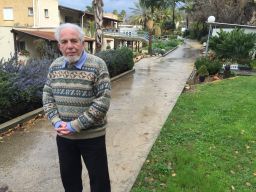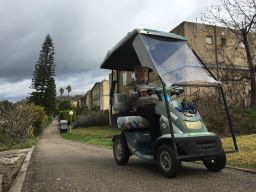Story highlights
U.S. presidential candidate Bernie Sanders spent time in a kibbutz in Israel
Albert Ely, 79, remembers an American in the early '60s whose name stuck out
A small collective community in northern Israel, modeled after the communist ideals of the Soviet Union, may hold clues to the development of U.S. presidential candidate Bernie Sanders’ political beliefs.
Sanders is Jewish and a self-described “democratic socialist.” In the 1960s, he spent several months volunteering on an Israeli collective farm, or kibbutz, that functioned according to communist principles.
READ: Sanders, Trump win New Hampshire primary

For years, Sanders has said he had been on a kibbutz but has been vague about exactly where he stayed. The mystery was apparently solved last week when Israeli newspaper Haaretz dug up a 1990 interview with Sanders. In the article, Sanders claimed he spent several months in 1963 volunteering at Shaar Ha’amakim.
The kibbutz was a cornerstone of Israeli society in the decades before and after the nation was founded in 1948. They were a way for Jewish immigrants from all over the world to work together, growing crops and building a sense of community.
Members, known as kibbutzniks, looked after the land, shared property and distributed profits equally.
Inside Shaar Ha’amakim kibbutz
The role and influence of the kibbutz has greatly diminished in modern Israel, but many still exist today. Industry has overtaken agriculture as the primary revenue source for most of them.
Shaar Ha’amakim is a kibbutz near Haifa, a 90-minute drive from Jerusalem near the northern border with Lebanon. The small community, population around 800, is nestled amongst green hills and is located just minutes from modern retail stores and restaurants. It was founded by Jewish immigrants in 1935 on land purchased from Arab landowners.

At first glace, Shaar Ha’amakim resembles a retirement community. Senior citizens on golf carts zip down quiet, private lanes lined with shrubs. They live in humble, cozy apartments. Nearby fields are full of sunflower seeds, avocados and tangerines. Agricultural revenue also comes from dairy cattle. But today, the kibbutz makes most of its money by producing solar water heaters at an on-site factory.
Albert Ely, 79, has been a kibbutznik for almost 60 years. In 1963, at age 22, he worked in the fruit orchards and was in charge of the American and French volunteers. He distinctly remembers an American in the early ’60s whose name stuck out.
“I heard the name Bernard. Bernard is a French name,” Ely says. “The only thing I remember is (thinking), ‘How can an American call himself Bernard? It’s a French name!”
READ: Bernie Sanders could be the first Jewish president. Does he care?
‘You have to take care of the weak’
Ely didn’t recognize a 1963 photograph of Bernie Sanders, then in his early 20s. Sanders would have been one of dozens of overseas volunteers at that time. Ely says many of those who came to the kibbutz wanted to learn about socialism and how it works.
“Maybe that had an influence on (Sanders),” Ely says.
When he moved to the kibbutz, Ely admits he “didn’t know a thing about communism.” But he studied the political philosophy of Marxism-Leninism, the socialist ideology on which the former Soviet Union was based.
“It was once communism. Today it’s socialism. Call it whatever you want,” Ely says. “It’s a number of people who want to live together. And want to share everything together. We think that you have to take care of the weak (community members). The strong can deal with themselves.”
In those days, work for overseas volunteers consisted of picking fruit. Evenings were filled with community gatherings.
Ziv Itzhaky, 46, grew up on the kibbutz and says he has fond memories of overseas volunteers sharing popular music and teaching kibbutzniks how to play basketball and football.
He says the kibbutz could not have survived the Yom Kippur War in 1973 without volunteers from other countries, who stepped in when all the men were mobilized to fight in the conflict. Reserve service, like active military duty, is mandatory for most Israelis.
The volunteers “were the only men in the kibbutz,” Itzhaky says. “They stayed. They held this kibbutz together.”
Changing times
The last group of overseas volunteers left Shaar Ha’amakim about a decade ago, the result of a changing business model and the overall decline of the kibbutz in Israeli society.
Itzhaky holds his newborn son and gazes across the street at the old, empty kibbutz pub. Evenings were often spent at the watering hole, which is adorned with statues of robots made out of scrap metal. Similar scrap-metal statues of objects and animals are scattered throughout the kibbutz. Now they serve as rusty reminders of how life used to be.
“Once the volunteers stopped coming, all the parties stopped. And the fun stopped. We learned a lot from them,” he says. “The kibbutznik(s) say that life in the kibbutz ended when the volunteers stopped coming. That’s why the pub closed. There’s no more parties on Friday night.”
But Ely, who has been diagnosed with cancer, says he has great hope for the future. He’s happy that Sanders is running for president of the United States.
“I hope he’ll succeed. I hope he’ll change things,” Ely says. “Not for me, I’m too old. For the rest of the people.”


